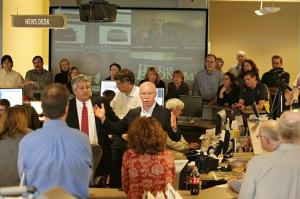
The Rocky's Newsroom Gets the News: It's Over
We have these “truths” we seem to hold so damn self-evident in local news, the whole “they can’t live without us” stuff that the smartest tv newsers still cling to like baby blankets. The problem is, these fundamental truths don’t really hold up under close examination, and with every passing day, there’s more and more evidence that what we do is not the “given” we have so long believed it to be. Remember once, it was a “given” that a lower channel number was better than a higher one, and UHF? Oh my God. UHF. The other day I mentioned the concept of UHF and got a blank stare from an intern at a top university. They don’t teach it, because it’s irrelevant. Not only is channel number irrelevant, as local stations go digital, the channel number we may be clinging to won’t even be the right number anymore.

The Rocky's New Year's Edition, 1900
It’s a new ballgame. And it’s a game we can lose. I crack up reading these determined posts on tv sites, where newsers debate the future ownership of certain stations. Inevitably, someone will chime in that one of the networks is “dying” to buy this or that station. Really? Are networks buying stations, or looking for a way to get out of the local affiliate model altogether? What are the odds your market will continue to support three, four, five or more local tv newsrooms over the next five years? I hate to bring up the comparison, but without a new model and some innovation away from the news at 6, and 11 and “innovations” like weekend morning news and “webcasts,” we may be looking a lot more like newspapers than any of us would care to admit.
Print had a multi-paper heyday. Now many cities are one-paper towns, and some have no paper at all. Tomorrow, the Rocky Mountain News will hit the streets of Denver for the last time, shutting down after 150 years. Don’t even start to say that can’t happen to your might fifty years of history at Channel 6.
WTVJ/Miami: Florida History Dating to 1949
In Miami, NBC’s WTVJ was as good as gone, offloaded by NBC to Post-Newsweek to be rolled into an ABC-NBC duopoly that many (especially in the TVJ newsroom) feared would mean, essentially, eliminating their newsroom and running WPLG’s product on two channels, with one staff, under one roof. (The TVJ call letters, channel assignment and peacock making the move; the majority of the news talent and support staff becoming the cost savings) The deal died, not for the concept, but for the banks. The loans that underpinned the purchase faded with the rest of the economy, and, for the time being, WTVJ, with its decades of South Florida history, lives on. But it was a close call that should open eyes. If a set of call letters like WTVJ can very nearly die off as a true, living, breathing, competitive newsroom in a big city, it can happen anywhere.
In Denver, Rich Boehne, CEO of Rocky owner E. W. Scripps Company, put it bluntly to the paper’s people: “Denver can’t support two newspapers any longer,” according to an account of the meeting published on the Rocky’s website, which noted that some staffers cried at the news of the paper’s death. “People are in grief,” said Editor John Temple.
On Saturday, Denver will become a one newspaper town, with the Denver Post the last man standing in an old west print duel that has waged since the 1920s.
Why not TV? Over at LostRemote, Cory Bergman blames that old “wall” for a “fatal disconnect” between us local tv newsers and the folks upstairs who get the Pontiac guy to buy spots. You know, when “they” get us some ads, we’ll be fine: “The problem,” Bergman blogs, “journalists wash their hands of the business side of the equation. That’s the business guys’ problem, said one newspaper journalist. But it’s not. It’s everyone’s problem.” His solution? Work together to create a product that people might want to buy–or watch. “By splitting journalism and business into two buckets separated by a longstanding cultural divide, the two groups fail to collaborate on ideas that tap the strengths of both. And neither have a track record of understanding how technology enables community, the greatest opportunity of all.”

Can the TVJ Legacy Be Saved?
Bergman believes–as I do–that finding a model beyond 5, 6, and 11, beyond the exciting addition of weekend morning news and email alerts (sent right to your mobile phone when weather threatens!) means recrafting the whole damn thing, which is something newspapers didn’t do very well, and tv’s not so hot at, either. (Look at the raging success of the DTV transition.) Bergman boils it down to putting the “business” back in the news business: “local journalists are losing their jobs, often blaming the business guys. But along with upper management, they’re all to blame for failing to collaborate. For failing to understand their users and advertisers’ evolving needs. Not OUR needs. But our CUSTOMERS needs.”
What do you think? Will your station be doing news in five years? Who will you be working for ten years from now? How long can we count on viewers showing up for appointment newscast viewing–and getting advertisers to pay for the privilege of buying time on those newscasts?
[FULL DISCLOSURE: I’ve worked at for E.W. Scripps, and Post-Newsweek, and know many of the people who would’ve been directly affected in the Miami duopoly, both the managers at WPLG who without a doubt would have created something unique and very likely profitable–and the journalists at WTVJ, who I consider good people and would have hated to see any of them lose their jobs]





